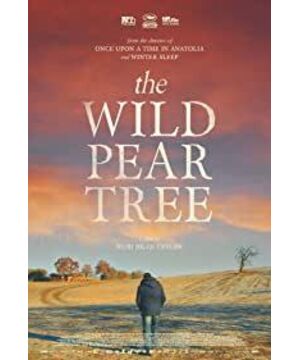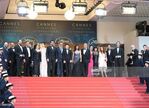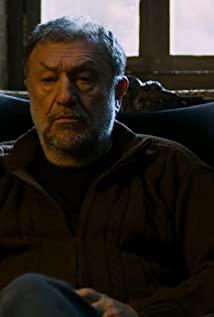The three-hour film, beautiful photographic lens and philosophical dialogue make this journey full of literary experience. While appreciating the poetic rural scenery in Turkey, I also need to carefully savor the dialogue between the characters from time to time. I was surprised by the director’s strong personal narrative style. I was gradually immersed in the difficult journey of the protagonist Sinan writing and publishing the book, and began to examine it. The connection between hometown and self, and literature.
The whole film mainly revolves around several experiences and dialogues of Sinan, a college graduate with a dream of being a writer, returning to his hometown. Each dialogue has a light or dark theme. I can only talk about my understanding of these parts. It should be said that if you understand these dialogues with strong literary and philosophical significance, you can better understand the theme of the film.
The first part is that Sinan found the mayor to discuss funding the publication of the book. Since Sinan’s personalized writing is not as beneficial to the local area as travel books, the mayor pushed him to a sponsor who reads a lot.
The second part is the dialogue between Sinan and his first love, Khadij, which is vague and melancholic, and it is about the situation of women. Sinan bluntly said that he did not intend to stay in his hometown and stay here to rot. This touched Khadij’s inner pain. The fate of welcoming her, like most women, would be getting married and doing nothing. But for her, she can only choose the life closest to her, which makes her feel sad. It can be seen from the depth of the conversation that she also likes literature and was influenced by Sinan. But not everyone can have a teacher father like Sinan, who supports him in completing his studies. Although Khadijie laughed and said that he didn't want to study anymore, he could also see the general situation of women in education. After talking about marriage, she revealed a deep sense of life tragedy. To Sinan, whom she had been obsessed with, she was about to go to a marriage of scorpions under gold and silver. However, she still loves Sinan, leaving a deep mark on her lips, which is how she wants him to remember herself. Sinan didn't do anything. After witnessing Khadijie's marriage with his former rival, the rival fought against Sinan because of the failure of his love with Khadijie. This kind of irrational jealousy is just a helpless catharsis. Sinan’s love seems to have ended in a plain and tragic way. Finally, his mother asked him if he had a girlfriend. He said that he was poor and unemployed. There would not be any. It was also true after he experienced this love. Feel. However, Sinan’s greatest motivation in life is to publish a book to become a writer. The reality gap makes it impossible for him to have deep feelings for Khadijie, so the next step is to continue to pursue his dreams.
The third part is Sinan’s hidden sharp conversation after meeting a well-known writer who writes "Literature and the Country" in a bookstore. This part also focuses on Sinan's views on self-writing and literary expression. Sinan calls his work a fictional metafiction about life culture. He is worried that his personal writing will not arouse public interest, and he has no job and is not gifted, but at the same time he does not like the kind of doing it for himself. Advertising-like biographical writing, as well as the author’s recommended writing technique. The writers of the seminar felt that language is the only center of literature, and Sinan’s bones despise these writers who sell stories rather than pay attention to real situations. He believes that art is lonely and is against everything, as the writer calls "obsessed romantics." In the end, the writer couldn't stand this questioning, completely exposing his nature. In fact, the purpose of his literary creation has a huge utilitarian purpose. Writers feel that they have to write not out of their true self, but a desire for success. The formation of the so-called art alliance is more like a slogan. Sinan finally angered the writer, and the request for the writer to evaluate the work was lost. Attempts to get my work to get advice from people in the circle are broken. Later, Sinan finally published a book, and the book has been uninterested. When he left the bookstore, he saw a promotional photo of the author's new book hanging at the door and turned his head disdainfully.
The fourth part is that Sinan found a sponsor recommended by the mayor. This paragraph can be seen as a collision between Sinan as a college student and the opinions of most people in his hometown. Turkey is world-famous for its long history and tourism culture, while Sinan cares about the living people in the countryside except for those historical achievements. The culture of the hometown is composed of individuals and is unique. Covered by the grand narrative of history. For example, he wrote about an 80-year-old man who is still working. Behind that old man is the secret of life. Countless people have written about tourist sites, and people's true living conditions are more worthy of attention. Literary writing should not be a tool of propaganda. Sponsors sneered at Sinan’s ideas and opened up some of his principles. In his opinion, people who have never gone to college are happier than those who have gone to college. “Of course, education is very good, but This is Turkey. If you want to survive in this country, you need to adapt.” I think the sponsor’s point of view here should indicate a deep separation between the Turkish social elite and the public, and the public has a natural distrust of the elite. In particular, although Sinan is an educated college graduate, he has no job or money, and is still in a disadvantaged position in secular concepts. Therefore, young people like him actually have a big tear with the world in their hearts, that is, education. It brings more contrast between society and life thinking and reality. Of course, the so-called sponsors don't actually read much. They publish books just to do business. This contrast also makes Sinan aware of the reality of his hometown. However, he always has complex emotions about his hometown. Even if he knows that he will not return here, he still has a spiritual homesickness, and he has the most instinctive understanding and perception of the people in his hometown. I think this is similar to many writers and directors who use their hometown as the blueprint, such as Liang Hong's "China in Liangzhuang", Jia Zhangke's "Platform" and "Xiaowu". The section chief once said that this is a kind of "authority." Because he knows his hometown people best, he regards this as his loyalty to his spiritual life. The hometown may not be beautiful, but we may write honestly on that land throughout our lives.
In the fifth part, Sinan and the two patriarchs of the village argued over the topics of religion, existence, and free will. The patriarch said that believers only need absolute loyalty to the religion, while Sinan believes that believers should be able to criticize themselves. Sinan is obviously an atheist. He uses a theory similar to Sartre's existentialism to refute the patriarch- man should act in accordance with conscience and free will, he should establish his own responsibility instead of being forced to accept, and must bear all the consequences of his actions. Therefore, he felt that people with courage should choose to exist instead of being enslaved by religion. Faith and religion are like the strong dragging the weak away. The patriarch thinks this is the best way to control people, otherwise people will lose their spiritual support, feel lonely, and no one wants to find the truth about themselves. The patriarch also quoted the famous words of Yunus Emre and Ibn Arabi, the most beloved poet of the Turkish people. Sinan sharply pointed out the paradox of religion . Religion prevents people from knowing the truth. People attribute everything to fate and cause and effect instead of feeling pure (in accordance with the existentialist view). Sartre said, “Man is what he wants to be after he does not exist. Man is nothing but what he thinks.” In short, this part of the confrontation between philosophy and religion is very exciting. The patriarch’s point of view is that religion can be. To save the poor in a region, Sinan is obviously more concerned with philosophical issues about the nature of survival, such as how people find themselves.
The above dialogue is one of the main lines of the movie. The other main line revolves around the family life in Sinan and the relationship between generations. Most of the film reviews in this part have also analyzed. After patiently watching a dialogue, I really admire the director's film text skills. Sinan is an idealistic literary youth who likes to think and debate whenever he meets everybody. The people who argue with him may be unbearable in one way or another, but the confrontation between the two views also provides a three-dimensional display of local culture. The foundation of Southern Hometown writing. Without the spirit of inquiry like Sinan, we would not be able to gain insight into the real people living in our hometown. There are some people here who can walk with you on the road to talk about philosophy and religion, and some who seem to be enthusiastic but are hypocritical and self-interested. This kind of argument under the director’s lens does not have an obvious value orientation. We don’t even know that Sinan’s inner activities after frustration only convey a kind of emotion to people through images, such as the same sound after every dialogue. With that repressive and cold music, we can continue to wait and see where Sinan should go in the next step in this faint sense of emotion.
Finally, I conclude with the conversation between Sinan and his father.
We are all discordant, lonely, and deformed people.
Everyone has their own temperament. The key is to accept and like it. The fruit of wild pear is deformed like you said, but I ate it for breakfast a few days and it was very delicious.
Although the previous experience was very sad, Sinan realized and accepted his own uniqueness after experiencing so many real collisions, and began to use actions to try to break through the unsolvable dilemma of life.
View more about The Wild Pear Tree reviews










